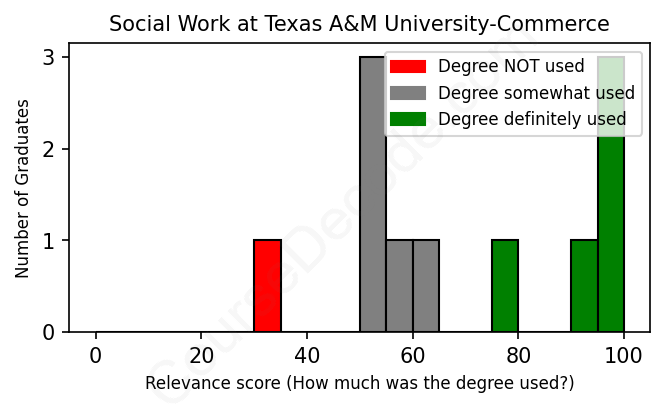
First, some facts. Of the Social Work graduates from Texas A&M University-Commerce we've analyzed , here's how many have used (or NOT used) their degree in their career:

These are estimates based on AI analysis of 11 LinkedIn profiles (see below).
The verdict? Slightly above average. Overall, with an average relevance score of 69%, Social Work graduates from Texas A&M University-Commerce have a slightly higher likelihood (+2%) of finding work in this field compared to the average graduate across all fields:
And for comparison, here's the chart for all profiles we've looked at across all degrees.
Also, after graduating, 72% of these graduates have pursued further education other than another Bachelor's degree (such as a Masters degree or other), compared to the average across all profiles of 35%. This suggests you may need more than just a Bachelors degree to be competitive as a Social Work graduate.
See the details:
|
Relevance score: 61% We think this person has gone into a career only somewhat relevant to their degree. We think this person has gone into a career only somewhat relevant to their degree.
DEGREE INFOGraduated in 2012 from Texas A&M University-Commerce with a Bachelor's Degree in Social Work. Also pursued further education since (see below). JOB HISTORY SINCE GRADUATIONSocial Work Intern Communities In Schools of Northeast Texas Jun 2012 - Dec 2012 Administrative Assistant  Pain Management Associates Jan 2014 - May 2014 Master of Social Work Intern  Orange County Rescue Mission/ Hurtt Family Health Clinic (FQHC) Sep 2014 - May 2015 Clinical Social Worker  Hurtt Family Health Clinic (FQHC) Jun 2015 - Nov 2015 Family Service Worker  Upbring Nov 2015 - Feb 2017 Area Director  Upbring Feb 2017 - Feb 2018 Home Study Contractor  Independent Contractor - Foster/Adoption Agencies Feb 2018 - Present FURTHER DEGREES DONE SINCE GRADUATINGMaster's DegreeAzusa Pacific University 2014 - 2015 ABOUTNo information provided. |
The top 10 most common jobs done by the graduates we've analyzed (ranked most common to least) are:
The job market for graduates with a degree in Social Work from Texas A&M University-Commerce is quite diverse. Many individuals have taken on roles that relate to student affairs, education, and welfare, which often employ some principles from social work but may not fully leverage the degree’s core competencies. Positions like Admissions Counselor, Residence Life Coordinator, and Higher Education Advisor show a strong connection to social work principles, emphasizing student support and counseling. On the other hand, roles such as Foreclosure Specialist or Data Entry Coordinator primarily focus on administrative tasks or financial services, which do not align closely with social work practices.
Overall, while several jobs in the analysis reflect a solid application of social work skills, there are quite a few that seem to stray from the core essence of the degree. It’s clear that many graduates find themselves in positions where they can utilize social work knowledge but often in ways that may not seem directly related to traditional social work settings like therapy or counseling. This indicates that a social work degree can be versatile and valuable across various sectors, although not all graduates end up in roles that fully utilize their educational background in a conventional way.
Here is a visual representation of the most common words in job titles for Social Work graduates (this is across all Social Work graduates we've analyzed, not just those who went to Texas A&M University-Commerce):

When looking at the career trajectories of graduates who earned their Social Work degrees from Texas A&M University-Commerce, it seems that many of them start off in positions closely related to social services, community outreach, or education. For instance, graduates in the early years often take on roles like social work interns, case aides, or youth leaders, which gives them a solid foundation in the field. There’s a notable presence of individuals moving into roles at agencies that provide support to families, children, and marginalized groups, showcasing a strong commitment to social welfare right out of the gate.
As these graduates progress over the years, their roles often evolve but remain largely in the realm of social work or education-related fields. Five to ten years post-graduation, some have transitioned into higher-level positions, such as area directors, program coordinators, or even directors in admissions and training, suggesting they are building significant careers in leadership and management within their respective domains. However, there are also instances where graduates have taken paths that veer away from traditional social work roles, entering into administrative or unrelated fields, which can indicate a diversifying career trajectory. Overall, it seems that many of these grads find good opportunities that align with their social work backgrounds, although some do explore different avenues as they gain experience and seek new challenges.
Honestly, a Bachelor’s degree in Social Work can be a bit of a mixed bag when it comes to difficulty, and Texas A&M University-Commerce is no exception. It’s not the easiest degree out there, mainly because it involves a lot of hands-on learning, theory, and understanding human behavior, which can be pretty deep sometimes. You’ll have to juggle coursework, readings, and practical field placements, so it can feel like a lot, especially if you're not super into tackling complex social issues or working with diverse populations. But if you’re passionate about helping people and ready to dive into some challenging yet rewarding content, you'll probably find it manageable and even enjoyable!
Most commonly, in the LinkedIn profiles we've looked at, it takes people 4 years to finish a Bachelor degree in Social Work.
Looking at these grads from Texas A&M University-Commerce, it seems like they’ve landed jobs in various fields related to social work and education, but the pay range is pretty mixed. Some, like the ones in higher education administration and management roles, might be making decent salaries, especially as they advance in their careers. Others, particularly those in direct support roles like case management or teaching, probably don’t earn as much, which is kind of typical in those fields. Overall, while there are some decent paychecks in the mix, many might still be on the lower end of the income scale, especially given the nonprofit nature of a lot of social work positions. So, it's a bit of a mixed bag when it comes to how much money they're making.
Here is a visual representation of the most common words seen in the "about" section of LinkedIn profiles who have a Bachelor degree in Social Work (this is across all Social Work graduates we've analyzed, not just those who went to Texas A&M University-Commerce). This may or may not be useful:

Here are all colleges offering a Bachelor degree in Social Work (ordered by the average relevance score of their Social Work graduates, best to worst) where we have analyzed at least 10 of their graduates: